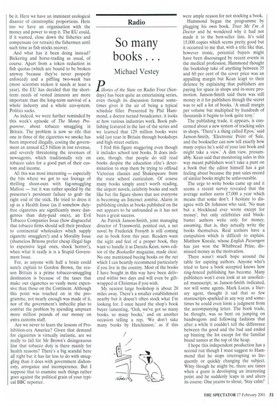So many books . . .
Michael Vestey
atones of the State on Radio Four (Sundays) has been quite an entertaining series, even though its discussion format sometimes gives it the air of being a typical schedule filler. Presented by Phil Hammond, a doctor turned broadcaster, it looks at how various industries work. Book publishing featured in the last of the series and we learned that 129 million books were sold last year in Britain through bookshops and high street outlets.
I find this figure staggering even though it includes school text books. It does indicate, though, that people do still read books despite the education elite's determination to stop them by trying to offload Victorian classics and Shakespeare from the state school curriculum. Of course many books simply aren't worth reading, the airport novels, celebrity books and such like but the figure shows that not everyone is becoming an Internet zombie. Alarm in publishing circles at books published on the net appears to be unfounded as it has not been a great success.
As Patrick Janson-Smith, joint managing director of Transworld, pointed out, a net novel by Frederick Forsyth is still coming out in book form this year. Readers want the sight and feel of a proper book, they want to handle it as Danuta Kean, news editor of the Bookseller magazine, made clear. No one mentioned buying books on the net which I can heartily recommend particularly if you live in the country. Most of the books I have bought in this way have been delivered within two days and will even be giftwrapped at Christmas if you wish.
My nearest large bookshop is about 20 miles away. There's a smaller establishment nearby but it doesn't often stock what I'm looking for. I once heard the shop's book buyer lamenting, 'Ooh, we've got so many books, so many books,' and on another occasion telling a rep, 'We don't take many books by Hutchinson,' as if this were ample reason for not stocking a book.
Hammond began the programme by plugging his own book, Trust Me I'm A Doctor and he wondered why it had not made it to the best-seller lists. It's sold 15,000 copies which seems pretty good but it occurred to me that, with a title like that, however ironic, potential buyers might have been discouraged by recent events in the medical profession. Hammond thought the bookshop take of anything between 35 and 60 per cent of the cover price was an appalling margin but Kean leapt to their defence by explaining that publishers are paying for space in shops and in-store promotion. Janson-Smith said there was still money in it for publishers though the secret was to sell a lot of books. 'A small margin per volume but multiplied by hundreds of thousands it begins to look quite rosy.'
The publishing trade, it appears, is concerned about a new system of tracking sales in shops. 'There's a thing called Epos,' said Janson-Smith, 'Electronic Point of Sale, and the bookseller can now tell exactly how many copies he's sold of your last book and might take a view.' A dim view, presumably. Kean said that monitoring sales in this way meant publishers won't take a punt on a book that the editor himself has a gut feeling about because the past sales record of similar books might be unfavourable.
The urge to write books came up and it seems a recent survey revealed that the average author earns £7,000 a year which means that some don't. I hesitate to disagree with Dr Johnson who said, 'No man but a blockhead ever wrote except for money', but only celebrities and blockbuster authors write only for money, assuming, that is, they actually write the books themselves. Real authors have a compulsion which is difficult to explain. Matthew Kneale, whose English Passengers has just won the Whitbread Prize, dismissed money as the motivation.
There wasn't much hope around the table for aspiring authors. Anyone who's tried to have a book accepted knows how ring-fenced publishing has become. Many publishers won't even look at an unsolicited manuscript, as Janson-Smith indicated, nor will some agents. Mark Lucas, a literary agent, thought it sad that so few manuscripts sparkled in any way and sometimes he could even form a judgment from the accompanying letter. The book trade, he thought, was so bent on jumping on bandwagons and following fashions that after a while it couldn't tell the difference between the good and the bad and ended up binning the lot except for the familiar brand names at the top of the heap.
I hope this independent production has a second run though I must suggest to Hammond that he stops interrupting so frequently or quickly changing the subject. Witty though he might be, there are times when a guest is developing an interesting point and he suddenly leaps in and alters its course. One yearns to shout, 'Stay calm!'


































































 Previous page
Previous page